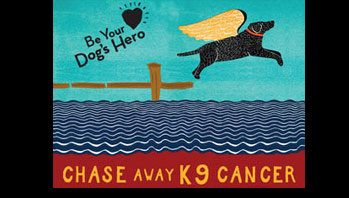 “Clinical Evaluation of Carboplatin plus Gemcitabine in Canine Osteosarcoma.” Dr. Cheryl London and Dr. Melanie McMahon (Resident) — $49,680.00 (1-year grant). The Ohio State University.
“Clinical Evaluation of Carboplatin plus Gemcitabine in Canine Osteosarcoma.” Dr. Cheryl London and Dr. Melanie McMahon (Resident) — $49,680.00 (1-year grant). The Ohio State University.
Osteosarcoma (OSA) is the most common bone tumor in dogs occurring primarily in the long bones resulting in bone destruction, pain, lameness and metastasis primarily to the lungs. Treatment involves limb amputation followed by chemotherapy. Despite the treatment, approximately 90% of dogs with OSA will die of metastasis within 2 years of amputation. Therefore, it is critical that more effective treatments be developed.
Gemcitabine is a chemotherapy drug that incorporates into the cell DNA, eventually leading to cell death. In a previous study funded by the ACVIM Foundation, the investigators have generated data demonstrating the efficacy of gemcitabine against canine OSA tumor cells in the laboratory. They have also demonstrated that when gemcitabine is combined with carboplatin, killing of tumor cells is greater than when either drug is used alone.
Objective: based on these encouraging preliminary findings, as well as evidence for superior clinical activity of combined gemcitabine and carboplatin for the treatment of human cancers, the investigators have initiated a clinical trial to determine whether gemcitabine administered in combination with carboplatin will improve outcome in dogs with OSA. In this study, 50 dogs with appendicular OSA will undergo limb amputation followed by four treatments with carboplatin and gemictabine administered on the same day. Dogs will then be followed to determine whether the combination of these two drugs is capable of significantly prolonging 1 year survival rates in affected dogs.
This clinical trial, funded by the ACVIM Foundation’s Chase Away K9 Cancer Campaign, represents a joint effort between the Ohio State University Veterinary Teaching Hospital and the New England Veterinary Medical Oncology Group in Waltham, MA.
 “Developing novel single chain targeted agents for canine hemangiosarcoma.” Dr. Nicola Mason — $30,314.00 year one; $17,000.00 year two ($47,314.00 total for 2-year grant). University of Pennsylvania.
“Developing novel single chain targeted agents for canine hemangiosarcoma.” Dr. Nicola Mason — $30,314.00 year one; $17,000.00 year two ($47,314.00 total for 2-year grant). University of Pennsylvania.
Canine hemangiosarcoma is an aggressive cancer of blood vessels that commonly affects large breed dogs. Currently, available chemotherapeutic regimens results in a median survival time of approximately 6 months. Recently, adjuvant immunotherapies (treatments to stimulate or restore the ability of the immune (defense) system to fight infection and disease) have extended the survival times but mortality rates remain high and novel targeting approaches for the treatment of this disease are needed. The use of target specific antibodies to directly target the tumors has shown promising results in human clinical trials. For the antibodies to be effective they first need to recognize the enemy that is the antigen. In dog models this immunotherapy approach has a great limitation because in dogs the tumor antigens have not been identified.
Objective: In this proposal, the investigators aim to use molecular techniques developed in their laboratory to generate a specific antibody from canine patients with hemangiosarcoma and screen them to identify an antibody that specifically targets cancerous blood vessel cells (antigens in this case). This work aims to break the self-tolerance (where the antibodies will not destroy the normal cells) and generate antibody responses against their own tumors in dogs.






